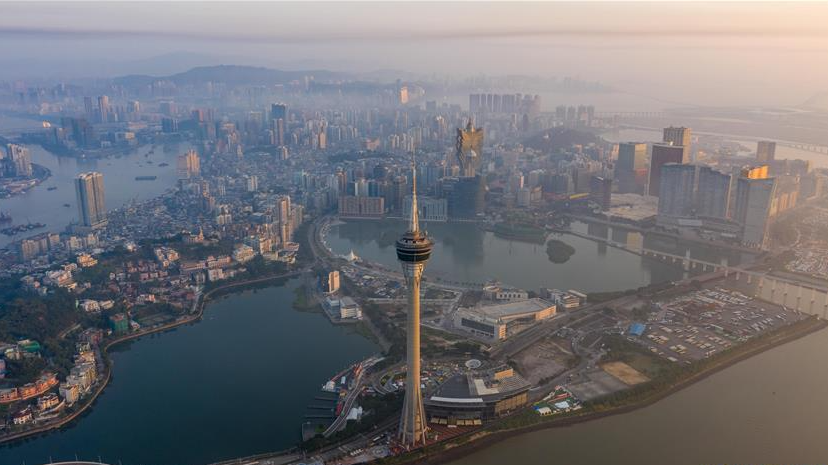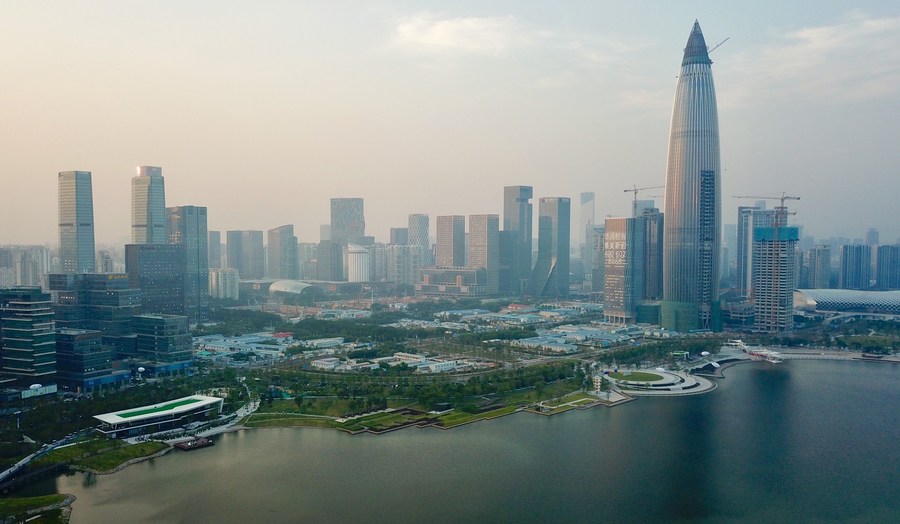
The Macao Tower, Sai Van Lake and Nam Van Lake in south China's Macao. /Xinhua
The Macao Tower, Sai Van Lake and Nam Van Lake in south China's Macao. /Xinhua
Editor's note: Alexandr Svetlicinii is an associate professor of law at the University of Macao, where he also serves as program coordinator for the Master of Law in International Business Law in English Language program. The article reflects the author's opinions and not necessarily the views of CGTN.
December 20 marks the 22nd anniversary of the People's Republic of China's (PRC) resumption of the exercise of sovereignty over Macao and the establishment of the Macao Special Administrative Region (SAR) under the principle of "One Country, Two Systems" embedded in the PRC Constitution and the Macao Basic Law. While preserving the Macao SAR's autonomy in local legislation and social policies, the system also allows the region to benefit from the national industrial policies and development projects. The importance of the "One Country" component has become especially pronounced amid an economic downturn caused by the COVID-19 pandemic.
Since gaining the status of SAR, Macao has grown to become the world's gaming hub, surpassing Las Vegas in gaming revenues already in 2006. At the same time, while deriving the bulk of its public revenues from gaming concessions, the Macao SAR government has attempted with a limited degree of success to diversify the city's economy and develop other services sectors that could provide local residents with fulfilling employment opportunities and rising income prospects.
The need to intensify this process has become urgent in the wake of COVID-19 as anti-epidemic measures including travel restrictions and the cancellation of group tours from the Chinese mainland have drastically reduced gaming revenues and delivered a hard blow to Macao's tourism-oriented economy.
The central government confirmed its support for Macao's economic diversification as early as 2009, when the CPC Central Committee announced its decision to develop the island of Hengqin, which is located in south China's Guangdong Province and is adjacent to the Macao SAR. During the past 10 years, President Xi Jinping has visited Macao six times and the adjacent Guangdong-Macao In-depth Cooperation Zone in Hengqin in the city of Zhuhai four times, which demonstrates the high importance accorded to the region's economic integration by the country's political leadership.

The Shenzhen Talent park in Shenzhen, south China's Guangdong Province. /Xinhua
The Shenzhen Talent park in Shenzhen, south China's Guangdong Province. /Xinhua
In 2015, the Macao SAR was attributed a special role with the Belt and Road Initiative (BRI) and in the development of the Guangdong-Hong Kong-Macao Greater Bay Area (GBA). The progress in implementation of these economic policies has allowed Macao to further benefit from support by the central and provincial authorities. For example, China's Ministry of Science and Technology has set up four key state laboratories, which have substantially enhanced the scientific profile of the Macao SAR and the local universities that host them.
In 2021, with the battle again the novel coronavirus still ongoing, the central government reaffirmed its support for the economic diversification of Macao and released a detailed master plan for the development of the Hengqin cooperation zone. It provided a unique system of shared responsibilities between the Macao SAR and Guangdong Province whereby the Hengqin cooperation zone will be managed by an administrative committee consisting of public officials from Macao and Guangdong. The master plan laid down several priority industries to be fostered in Hengqin: scientific and technological research, traditional Chinese medicine (TCM), tourism, convention and exhibition services, and modern financial services. It is obvious that the Macao SAR alone does not possess sufficient expertise, human or technical resources to develop these sectors, so the mainland's contribution will be crucial for the success of these plans.
First, the establishment of the Guangdong-Macao Traditional Chinese Medicine Technology Park will require the participation of TCM companies from the mainland and the relocation of qualified specialists to Hengqin.
Second, the master plan provides for a long-awaited financial services platform between China and Portuguese-speaking countries, where Macao could leverage its historical ties with these countries and further promote the internationalization of the Chinese renminbi. This endeavor will require the involvement of central regulatory authorities, as well as mainland and Hong Kong banks that already provide financing for trade and investment activities under the framework of the BRI. Because of the limited availability of local expertise in the field of financial services, Macao will need to further its cooperation with Shenzhen and Zhuhai in order to develop new financial products such as green finance products for businesses from the Lusophone countries.
Finally, the transformation of Hengqin into a "second home" for Macao's residents and businesses, especially medium, small and micro enterprises, will also require the flexibility offered by "One Country, Two Systems" in adjusting the regulations governing business activities, social security and public services to those of Macao SAR.
(If you want to contribute and have specific expertise, please contact us at opinions@cgtn.com.)

